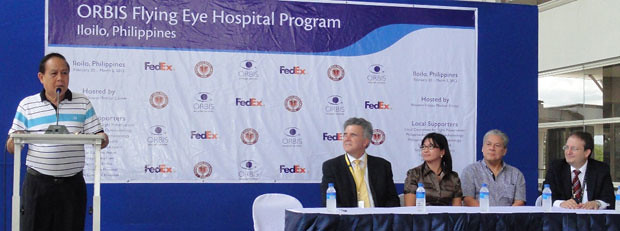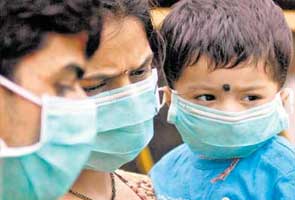 Impressed by the quality of available healthcare and the surge in advanced facilities in India, a team of international eye specialists aboard the Orbis flying eye hospital – the only of its kind in the world – Tuesday called for exchange of skills and information between countries to combat ophthalmic problems.
Impressed by the quality of available healthcare and the surge in advanced facilities in India, a team of international eye specialists aboard the Orbis flying eye hospital – the only of its kind in the world – Tuesday called for exchange of skills and information between countries to combat ophthalmic problems.
A team of of 23 eye specialists spanning 14 countries aboard the Orbis flying eye hospital began its operations during the day.
The flying hospital landed at the old wing of the domestic terminal of the Netaji Subhas Bose International airport here Monday. It will see around 150 patients and target a whopping 75 surgeries during a 17-day stint.
India`s “state-of-the art” facilities in eye care amazed experts from countries like Philippines, Mexico and Egypt. They were in deep admiration of the technological developments and the availability of centres to treat a gamut of eye issues including congenital and acquired problems.
“We are impressed by the quality of eye care available now and the advanced treatment options that you have. It is clear that India is one of the leaders in quality eye care. The country is known for high level of quality,” Ahmed Gomaa, medical director, Flying Eye Hospital told IANS.
A venture of US-based NGO Orbis, the hospital aboard a modified DC-10 aircraft has serviced 90 countries since its inception in 1982 and continues to bring in dedicated global volunteer training faculties in its fight against preventable blindness.
Besides India, Orbis operates in Bangladesh, China, Vietnam, Ethiopia, South Africa, Zambia and Latin America and Caribbean.
Its global partner includes Omega watches and with the aid of Alcon and Fedex, the programme aims to strengthen paediatric ophthalmic services in India.
The hospital`s previous stopover in India was at Jaipur in 2009.
Experts from the US, Philippines, South Africa, Mexico, Britain and India among others comprise the team that will train not only ophthalmologists, but also offer valuable insights to support staff such as nurses, biomedical engineers, anaesthesiologists and paramedics.
The training and surgery programme will be spaced out in two weeks in liaison with four host institutes – Regional Institute of Ophthalmology, Susrut Eye foundation, Disha Eye Hospital and Sankara Nethralaya. This will augment the winged hospital`s aim to further exchange of knowledge and skills among nations.
“What we need now is more exchange of skills. The flying eye hospital is actually geared towards that. And with India receiving patients from across the world this has become a necessity,” said Gomaa, a Britain-based Egyptian ophthalmologist.
Echoing Ahmed, Rahul Ali, Orbis country director, feels standardisation of facilities and treatments across India needs to be looked at.
“We need to have standardised practices in place. Our country is doing well in terms of eye care,” said Ali.
For Orbis staff-ophthalmologist Jing Barleta from the Philippines, such ventures are essential for countries like Philippines and India that have a “lot of similar” problems in eye health.
“There are a lot of patients and problems are a lot similar in both countries. What I find here is the doctors are well trained,” Barleta told IANS.
However for Barleta, who joined the Orbis team in 2010, the difference lies in the budget that Philippines allots for healthcare. Another sector where the country needs to buck-up is infrastructure.
“In Philippines the budget for government hospitals is a lot..which brings it to par with private healthcare. Indian government could do that. Also the infrastructure needs work,” said Barleta.
While Gabriela Ruiz Gonzalez from Mexico felt the bureaucratic restrictions hinders progress in healthcare, she observed that eye surgeons in India are extremely dexterous and with India excelling in cataract and cornea-related operations, the knowledge should be disseminated.
“A lot of paperwork is needed here which makes it most difficult to progress. But the surgeons here are so good with their hands. There are excellent doctors for cataracts in India and a lot of experience for corneal operations,” said Gonzalez.
Source: Zee News
 Dressed in a green surgical gown and cap, British restaurateur Rekha Patel cradled her newborn daughter at the Akanksha clinic in northwestern India as her husband Daniel smiled warmly, peering in through a glass door.
Dressed in a green surgical gown and cap, British restaurateur Rekha Patel cradled her newborn daughter at the Akanksha clinic in northwestern India as her husband Daniel smiled warmly, peering in through a glass door.


 India’s Dr Poonam Khetrapal Singh was elected the regional director of the WHO’s Southeast Asian region on Thursday.
India’s Dr Poonam Khetrapal Singh was elected the regional director of the WHO’s Southeast Asian region on Thursday. With one more person testing positive for swine flu at a local hospital, the total number of those infected by the H1N1 virus in the city has reached 52 this year.
With one more person testing positive for swine flu at a local hospital, the total number of those infected by the H1N1 virus in the city has reached 52 this year. Impressed by the quality of available healthcare and the surge in advanced facilities in India, a team of international eye specialists aboard the Orbis flying eye hospital – the only of its kind in the world – Tuesday called for exchange of skills and information between countries to combat ophthalmic problems.
Impressed by the quality of available healthcare and the surge in advanced facilities in India, a team of international eye specialists aboard the Orbis flying eye hospital – the only of its kind in the world – Tuesday called for exchange of skills and information between countries to combat ophthalmic problems.